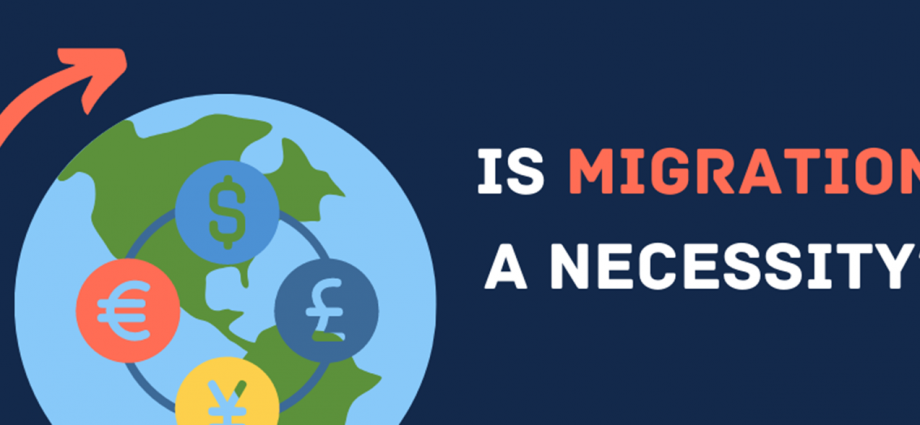Author: Shreyansh Jindal, Graphics: Nina Tagliabue
The BRB Bottomline
Political polarization has divided the world on key politico-economic issues. How will migration be affected by the challenges of the 21st century?
When former U.S. President Donald Trump imposed trade barriers on Chinese imports, the motive was clear: America first. Britain came up with a similar policy when it introduced Brexit: A movement that resulted in a long, political turmoil with questionable benefits. Similar policies are being implemented at more places around the globe like India’s “Make in India” campaign. What may initially look like an attempt at self-reliance could actually have both direct and collateral effects in the long run for the global economy.
“Nation first” policies in terms of trade eventually convert into political bigotries that act as hindrances to free immigration policies. At many levels, the cause and effect of free trade and immigration are the same. They share similar argumentation lines and target the agenda of “home vs. foreign”. Morality would suggest that people should be given the opportunity to work where they feel they would deliver their best. However, morality is not the only foundation in favor of free immigration. There are profound economic reasons and empirical-based research that need to be brought into light when debating the benefits of economic immigration.
Demographics vary across the globe. Some countries face overpopulation while others give incentives to immigrate. Immigration solves this demographic imbalance by allowing people from highly populated countries to go to relatively lesser populated ones. In addition, countries with an aging population benefit from immigration because it gives them the essential middle-aged workforce. Without free immigration policies, these countries will face serious economic problems and the inability to cater to the needs of the aged population. Countries must take actions that foster international ties and should not restrict them—especially at a time when a global pandemic has shown that the international economy cannot exist without multilateral cooperation.
Populism and Politics
Populists use migration as a tool to scare the voters that supporting pro-immigration political organizations would result in a loss of US jobs. An argument by American conservatives is that migrants are substitutes for domestic workers. Donald Trump often mentioned, “[immigrants] are taking your jobs” during his presidential rallies. However, economic research demonstrates the contrary. The rise in immigration levels in the US has historically given a positive correlation with the rise in employment levels. Migrants bring with them a unique set of expertise that supplements the existing workforce to get better results for the economy. Migrants also act as an added consumer base that promotes business development, in addition to starting their own businesses that hire American workers.
The Advent of Artificial Intelligence
The Fourth Industrial Revolution will inevitably bring changes in the job market. Economists predict that more than 120 million workers would mandate retraining in order to adjust for the skillset that their current salaries require. However, the overlap of the sector that automated machines can dominate and the lack of high-level skills required to operate those machines may make things worse
Education systems vary across countries which would lead to the polarization of skillsets and the ability to solve different challenges, over the long term. A country that failed to provide its students with 21st century skills will act as a potential place for development and skilled workers from foreign countries could aid that country to cope with international changes. Barring migrants from entering the economy will hinder growth and contribute to the increasing economic gap between the richer and poorer nations. Furthermore, immigrants could potentially establish corporations that result in better lives for local people and create job opportunities, thereby contributing to the economy’s development.
The Impact of COVID-19
The COVID-19 pandemic led the world into an era of increased nationalist tendencies and economic protectionism, referred to as slowbalisation by economists. Migrants were sent back to their home countries, global trade was reduced and international travel was paused. This period of crisis led a lot of governments to believe that accepting foreign immigrants for economic growth was bad for their domestic economies.
However, this line of reasoning has several economic flaws and is counterproductive for an economy’s growth. There is a reason why private corporations strongly support free immigration policies: productivity. Free immigration is not about whether foreign people should be given jobs over domestic people; it is about recognizing that growth and merit are more important than unfounded nationalism. Even developed countries may not have a large number of experts in every field and free immigration allows companies to hire from a broader range of prospective employees. Companies sometimes require immigrants for certain skills that the local inhabitants might not be accustomed to.
Take-Home Points
- Immigrants are not perfect substitutes for the local population due to their differences in language, appearance, and cultural understanding. They don’t compete with the local people as “replacements”
- For certain jobs, native people would retain the edge over migrants because of their locality’s knowledge, making migrants a part of an added workforce instead of substitutes.
- To ensure progress, the growing nationalist sentiments will have to curb down. Governments have the responsibility to do what is best for their economy and long-term stability. In these unpredictable times, policy judgments should not be driven by self-serving or populist motives, but rather economic reasons and growth prospects.

